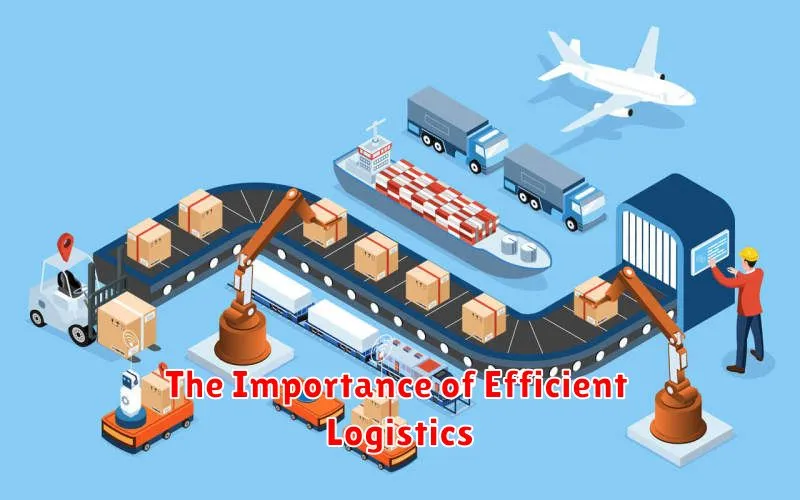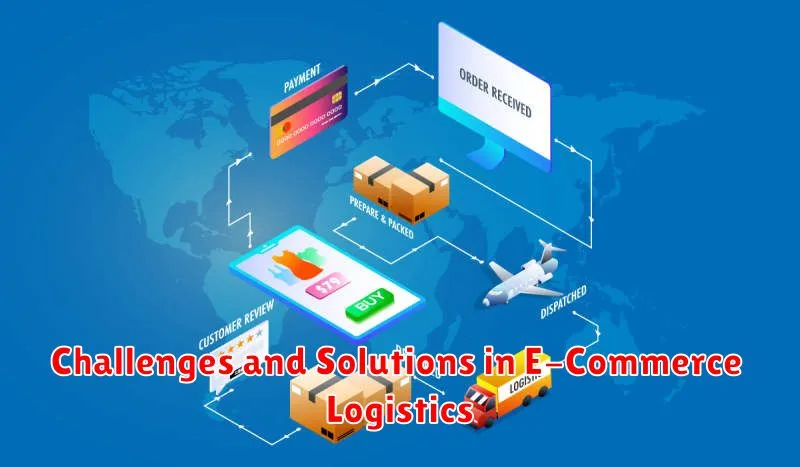Ever wondered about the intricate journey your online purchases take before arriving at your doorstep? From the moment you click “buy” to the satisfying thud of a package landing on your porch, a complex network of logistics swings into action. This article, “Unveiling the Journey: Understanding the Logistics Behind Your Online Purchases,” delves into the fascinating world of e-commerce fulfillment, exploring the crucial role of supply chain management, warehouse operations, and shipping strategies that ensure your orders are processed, packaged, and delivered efficiently.
Prepare to gain a deeper appreciation for the sophisticated logistics underpinning the convenience of online shopping. We’ll uncover the key processes involved in each stage of the journey, from order processing and inventory management to transportation networks and last-mile delivery. By understanding the complexities of this intricate system, you’ll gain valuable insights into the efforts required to bring your online purchases seamlessly to your hands, and appreciate the power of efficient logistics in the modern world of e-commerce.
The Order Placement Process
The journey of your online purchase begins with the order placement process. This crucial first step involves several actions working together seamlessly to ensure accuracy and efficiency. It starts when you, the customer, add items to your virtual shopping cart.
Once you’re ready to checkout, the system prompts you to provide essential information, including your shipping address and payment details. Accuracy is vital at this stage to prevent delays or misdelivery. The system then verifies your payment information, ensuring funds are available and the transaction is secure.
Upon successful verification, the order details are transmitted to the retailer. This includes product information, quantities, and your shipping preferences. An order confirmation is then generated, typically sent to your email address, providing a summary of your purchase and a unique order number for tracking.
This streamlined process marks the official placement of your order and initiates the subsequent stages of the fulfillment journey.
Warehouse Operations and Inventory Management
Efficient warehouse operations are crucial for fulfilling online orders promptly. Warehouses act as central hubs where inventory is received, stored, and processed before shipment. Their layout and organization significantly impact order fulfillment speed.
Inventory management plays a vital role in ensuring that products are available when customers place orders. Sophisticated systems track stock levels, predict demand, and manage the replenishment process. This minimizes stockouts and ensures order fulfillment can occur without delays.
Key aspects of warehouse operations include receiving and inspecting incoming goods, organizing storage locations for efficient retrieval, and maintaining optimal environmental conditions for certain product types.
Effective inventory management involves forecasting demand, setting reorder points, and managing supplier relationships. Real-time inventory tracking allows businesses to monitor stock levels accurately and react quickly to changes in demand.
Picking and Packing: Preparing Your Order
Once your order is confirmed, the picking process begins. This involves warehouse staff locating the correct items you ordered from their designated storage locations. Efficiency is key in this stage, often facilitated by sophisticated warehouse management systems that direct pickers along optimal routes.
After picking, the items move to the packing station. Here, they are carefully packaged to protect them during transit. This involves selecting the appropriate packaging materials, such as boxes, envelopes, or padded mailers, and ensuring the items are securely placed inside to prevent damage. The packing process also includes adding any necessary protective filling and sealing the package for shipment. This stage also often includes generating and inserting packing slips, invoices, and return labels within the package.
Shipping Options and Carrier Selection
Once your order is packaged, the next crucial step involves selecting the appropriate shipping method and carrier. A variety of factors influence this decision, including delivery speed, cost, and the weight and dimensions of the package.
Shipping options typically range from standard shipping (the most economical choice) to expedited options like express or overnight delivery. These choices directly impact the delivery timeframe, offering customers flexibility based on their urgency.
Carrier selection plays a vital role in ensuring efficient and reliable delivery. Online retailers often partner with multiple carriers, each with their own strengths and service areas. Factors such as the carrier’s reputation, tracking capabilities, and insurance options are carefully considered before assigning a carrier to a specific shipment.
Delivery to Your Doorstep
The final stage of the fulfillment process involves the actual delivery of your package. After being picked up from the warehouse, packages are transported through various hubs and sorting facilities within the carrier’s network. This intricate network allows for efficient routing and delivery across vast geographical areas.
Delivery methods vary depending on the carrier and the service selected during checkout. These can range from standard ground shipping, which typically takes a few business days, to expedited air shipping, which can deliver packages within 24-48 hours. Factors such as package size, weight, destination, and chosen delivery speed influence the final delivery time.
Upon arrival in your local area, the package is usually transferred to a local delivery driver for final-mile delivery. You might receive notifications updating you on the estimated delivery window. In some cases, you may have options for customizing your delivery, such as selecting a preferred delivery date or providing specific delivery instructions.
Successfully receiving your order marks the completion of the logistical journey, transforming your online purchase into a tangible item at your doorstep.
Returns and Exchanges
A crucial aspect of online shopping is the returns and exchanges process. This reverse logistics journey is often as complex as the initial delivery.
Customer satisfaction hinges significantly on a smooth and straightforward return experience. Factors like clear return policies, prepaid return labels, and timely refunds contribute to building customer trust and loyalty.
Retailers must establish efficient systems for processing returns, including inspecting returned goods, restocking inventory, and managing refunds or exchanges. This often involves coordinating with various partners, including shipping carriers and warehouses.
The reasons for returns can vary, from incorrect sizing or product defects to simply changing one’s mind. Understanding these reasons can help retailers improve their product descriptions, sizing charts, and overall customer experience to potentially minimize returns.
The Role of Technology in Logistics
Technology plays a crucial role in modern logistics, driving efficiency and enabling the complex operations behind online shopping. Warehouse Management Systems (WMS) are at the heart of this process, automating inventory tracking, order fulfillment, and storage optimization. These systems help manage the flow of goods within a warehouse, ensuring timely processing.
Transportation Management Systems (TMS) are another critical component. These systems optimize shipping routes, carrier selection, and delivery schedules, reducing transportation costs and transit times. Real-time tracking updates provided through these systems allow customers to monitor their order’s journey.
Furthermore, data analytics plays an increasingly significant role. By analyzing data from various sources, logistics companies can identify trends, predict demand, and optimize inventory levels. This predictive capability helps minimize stockouts and ensures that products are available when and where customers need them.
The Importance of Efficient Logistics

Efficient logistics plays a crucial role in the success of e-commerce. It directly impacts customer satisfaction, cost control, and overall business profitability. Customers expect timely delivery and seamless order fulfillment. A well-executed logistics system ensures products reach their destination quickly and in perfect condition.
Cost reduction is another key benefit. Streamlined processes, optimized routes, and effective warehouse management minimize operational expenses. This efficiency translates to lower shipping costs, reduced storage fees, and minimized losses from damage or theft.
Furthermore, efficient logistics enables businesses to scale their operations effectively. As order volume increases, a robust logistical framework can handle the growing demand without compromising speed or accuracy. This scalability is essential for sustained growth and competitiveness in the e-commerce market.
Challenges and Solutions in E-Commerce Logistics

E-commerce logistics faces a unique set of challenges. Last-mile delivery often presents the biggest hurdle, balancing speed and cost-effectiveness. Meeting customer expectations for fast and free shipping can strain resources.
Inventory management is another key challenge. Accurately forecasting demand and maintaining optimal stock levels across multiple locations is crucial to avoid stockouts or overstocking.
Reverse logistics, handling returns and exchanges, adds further complexity. Efficient processing and cost-effective management of returned goods are essential for profitability.
Solutions for a Smooth Operation
Addressing these challenges requires innovative solutions. Utilizing technology for real-time tracking and optimized routing can significantly improve last-mile delivery. Automated warehouses and inventory management systems help streamline operations and improve forecasting accuracy.
Partnering with third-party logistics providers (3PLs) offers scalability and expertise in handling various aspects of the supply chain, including reverse logistics.

